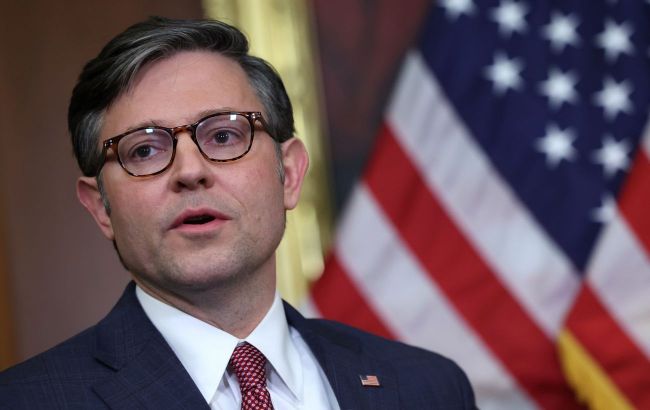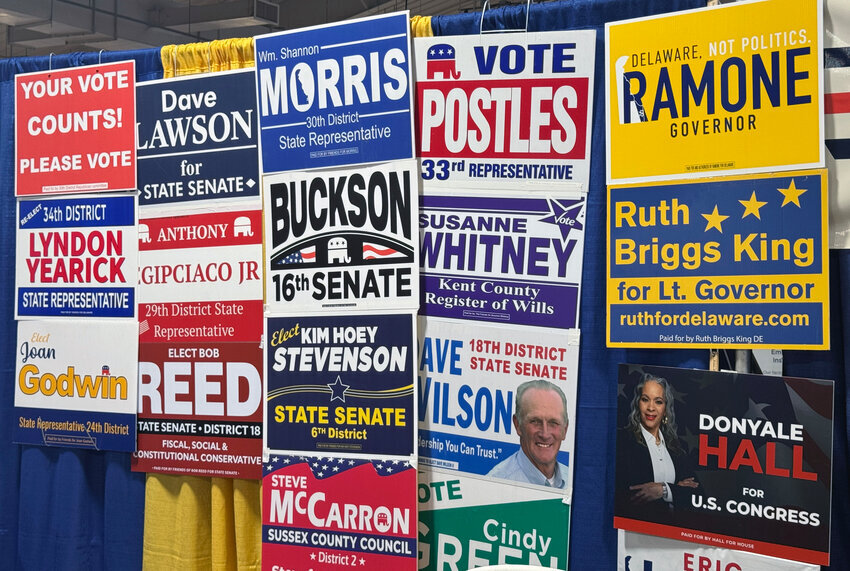Beyond presidential race: Why 2024 US Congressional elections matter for Ukraine
 Speaker of the US House of Representatives Mike Johnson (Photo: Getty Images)
Speaker of the US House of Representatives Mike Johnson (Photo: Getty Images)
On 5 November, the US will hold presidential and congressional elections. Read the article by RBC-Ukraine to find out why these elections are important and how they could affect support for Ukraine.
Contents
- House of Representatives elections
- Senate elections
- Trump and Harris rush to the rescue
- Risks after the election and Ukraine's interests
Alongside the presidential election in the United States, election for 13 governors and both houses of Congress will also take place. The lower chamber is the House of Representatives, where representatives are elected from small districts in each state. The upper chamber is the Senate, with two representatives from each state. The entire House of Representatives will be re-elected, while one-third of the Senate will be renewed.
"For Ukraine, this actually plays an even bigger role than who will lead the country itself. Because the president is not the final word. The president is one of the branches of power," Oleh Prelovskyi, an associate expert at the Institute of American Studies public organization, told RBC-Ukraine.
It is Congress that allocates aid to Ukraine. The difficulties of this process were highlighted by the four-month saga of voting for aid to Ukraine at the beginning of this year when congressmen aligned with Trump blocked the allocation of assistance to Ukraine in the House of Representatives for the sake of their electoral campaign.
Another crucial question is who will be the Speaker of the House of Representatives. As the head of this body, the Speaker has the power to bring bills to vote or not. The current Speaker, Mike Johnson, was the figure who directly blocked the passage of legislation concerning Ukraine.
House of Representatives elections
As with all US elections, the House races are conducted under a majoritarian system. Currently, Republicans hold a very slim majority in the House of Representatives, with 221 seats compared to the Democrats' 214.
"There is a relatively small number of competitive electoral battles out of more than 400 seats in the House of Representatives that will ultimately determine control over this body. Current polls indicate that Republicans hold a slight edge over Democrats for control of the House, but it's nearly a fifty-fifty split, and the party that wins will likely have only a narrow majority," Uriel Epshtein, executive director of the American non-profit organization Renew Democracy Initiative, told RBC-Ukraine.
According to The Cook Political Report, Democrats are guaranteed to win in 205 districts, while Republicans have secure leads in 208 districts.
The primary competition is focused on 22 swing districts.
In New York, the two parties are competing for six suburban districts, five of which Republicans unexpectedly won in the last election by appealing to issues like inflation and illegal immigration. However, this year, polls indicate that in nearly all of these districts, Democrats and Republicans have ratings that are neck-and-neck, within the margin of error. Over $110 million has already been spent on advertising in these districts.
Similarly, five key districts in California shifted unexpectedly to the Democrats in the last election. Notably, a significant portion of the population in these areas is Hispanic. Like New York, both parties have nearly equal ratings here, despite California as a state traditionally supporting Democrats in presidential elections.
The remaining "swing" districts are scattered across the country.
Senate elections
In the United States, senators are elected for six-year terms. The Senate does not change all at once; instead, one-third of the Senate is renewed every two years. In this election, 34 senators are up for re-election.
"If members of the House of Representatives work more at the state level and engage with voters on a party level, the Senate operates a bit differently. Senators deal with issues at the national level," explains Prelovskyi.
Currently, Democrats control 47 seats, with 4 independent senators collaborating with them. Republicans hold 49 mandates.
There is an interesting nuance regarding the Senate: if the number of Democrats and Republicans is equal, the decisive vote goes to the Vice President of the United States, who serves as the President of the Senate.
Thus, to gain a majority, Republicans need to win two additional seats if Kamala Harris becomes president, or one seat if Donald Trump wins. This is quite plausible.

Campaigning for candidates in Delaware (Photo: Bay to Bay News)
"It is expected that Republicans will win the Senate with a majority of a few seats. There are candidates from the Democratic Party at risk of losing seats, such as Jon Tester from Montana and Sherrod Brown from Ohio, and there will also be very close races in Pennsylvania and Wisconsin," says Epshtein.
Most of the mandates up for grabs this year are currently controlled by Democrats and their allies, totaling 23 out of 34 seats. Republicans are running for re-election in 11 seats.
"For Ukraine, it will also be important which states send which representatives to the Senate. Because some states do not hide the fact that they are more interested in domestic politics than foreign policy," Prelovskyi notes.
As CBS News points out, the outcome will be decided by the Senate elections in 11 states: Ohio, Michigan, Maryland, Nevada, Texas, Arizona, Florida, Montana, Pennsylvania, Wisconsin, West Virginia, and Nebraska.
Of these, 5 are "swing" states where the fiercest competition is taking place, including in the presidential election.
Trump and Harris rush to the rescue
Top US politicians like Harris and Trump often join the campaigns for the House of Representatives and the Senate.
For example, in New York and California, Democrats are relying on mass advertising and the expectation that the presidential election will boost turnout among their voters. Harris has made several campaigning trips across California, her home state.
Meanwhile, Republicans are taking more active measures in these two locations. House Speaker Mike Johnson and Trump himself are campaigning for their candidates. The presidential candidate visited California in mid-October and held a large rally at the legendary Madison Square Garden in New York City at the end of the month.

Campaigning by Donald Trump in New York (Photo: Spectrum News NY1)
The event in New York later played a cruel trick on Trump. During the rally, comedian Tony Hinchcliffe used offensive language, calling Puerto Rico a "floating island of garbage." It was only by sheer luck that this scandal was resolved, largely due to Joe Biden's clumsy response, in which he also referred to Trump supporters as "garbage."
The involvement of high-profile campaigners in district elections can yield varying results, and the impact is not always obvious. According to Epshtein, it's a million-dollar question: whether Trump and Harris will help their party's candidates locally, or whether strong candidates will instead draw votes away from Trump and Harris.
Epshtein cites examples from North Carolina and Arizona. In the former, Democratic gubernatorial candidate Josh Stein significantly outpaces his radical Republican opponent. The actual outcome is unlikely to be as lopsided, but in many polls, Stein has a lead of more than ten points. Meanwhile, the presidential race in North Carolina is extremely tight, with Trump holding a slight advantage.
"In Arizona, the Democratic candidate in the Senate race has a decent lead — considerably smaller than in North Carolina, but still. He holds this advantage over an unpopular Republican candidate. However, significant battles are occurring in the presidential campaign in Arizona. Thus, Stein in North Carolina and Gallego in Arizona could lift Harris — or Harris could elevate them. The same applies to Trump and the Republicans," Epshtein notes.
Adding to the complexity is the fact that there are different factions within both parties, says Prelovskyi. Among Republicans, there is a faction that informally remains opposed to Trump. For this part of the party, the politician's statements are seen as too radical. Similarly, the Democrats have a powerful left wing that is sometimes even referred to as Marxist.
At the same time, in single-member districts, the political affiliation of candidates is not the only factor; the individual candidate's personality — charisma, connections to the district, and reputation — also plays a significant role.
Risks after the election and Ukraine's interests
After the presidential and congressional elections, several scenarios are possible. In the first, the Republicans maintain control over the House of Representatives and gain the Senate. In this case, the position of the president will be of great importance. He will either have a fully loyal Congress or a completely hostile one.
However, there is also a strong likelihood that after the elections, Congress will be divided, with different parties controlling each chamber. This could lead to several problems.
On January 6, members of the US Congress will convene to tally the electoral votes, and the winner of the election is to be officially confirmed. In a context where the presidential race is extremely tense, one of the candidates may simply refuse to concede defeat. At least, Trump has hinted at this several times.
This scenario echoes events from the previous elections — January 6, 2021. At that time, Trump supporters stormed the Capitol, demanding the rejection of Biden's victory confirmation. Congress did not yield to the protestors then. However, this time, there is at least a risk that congress members will become political hostages in the post-election standoff.
Many supporters of aid to Ukraine remain in both chambers of Congress, but reaching agreements on joint legislation will become increasingly difficult.
"This will be difficult. The Republican Party is divided over Ukraine. When a major aid package for Ukraine, Israel, and Taiwan was finally passed earlier this year, just over half of the Republicans in the House of Representatives voted for it, and in the Senate, it was supported by less than half. However, how the Republican Party functions now with Trump in what is almost a cult-like leadership position largely depends on who wins the presidency," emphasizes Epsрtein.
If Trump is in the White House, he will dictate policy — he has even demonstrated the ability to influence departing Republicans by delaying a significant aid bill for Ukraine and our other allies for months.
"If Harris wins and Trump loses, he will still have influence, but it will be seriously weakened — by the next presidential election, he will be 82 years old, older than Biden is now, and he will be someone who lost the election twice in a row," he concludes.
Thus, contrary to the widespread belief that the US president single-handedly determines the course of the country, he will nonetheless have to look to the Senate and the House of Representatives. A "divided" Congress, where different parties control different chambers, could have varied implications for Ukraine.
On one hand, this risks slowing the release of future aid packages. On the other hand, especially in the case of a Trump victory, having a Democratic-controlled House of Congress could serve as a sort of check against overly drastic foreign policy maneuvers by the Republican.
Sources: materials from CNN, CBS News, The Cook Political Report, and comments from Uriel Epshtein, executive director of the American non-profit organization Renew Democracy Initiative, and Oleh Prelovskyi, Associate Expert at the public organization Institute of American Studies.

